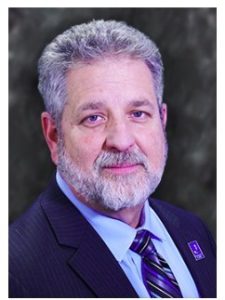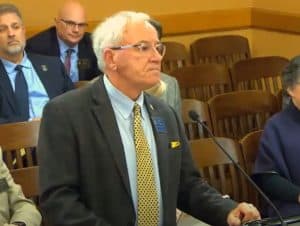Deputy Commissioner for Fiscal and Administrative Services Dr. Frank Harwood inaccurately told the Kansas State Board of Education that an aspect of school funding in next year’s budget is unconstitutional. Whether he knows he is incorrect or is just horribly misinformed is unclear, but a plain reading of the text and multiple court rulings refutes his statement to State School Board members.
Harwood explained the Safe & Secure Schools Grant in Senate Bill 125 at the April 8 board meeting. The budget allocates $1.5 million to purchase automated external defibrillators (AEDs) and training on AEDs and cardiopulmonary resuscitation (CPR); $1.25 million goes to public schools, and $250,000 is for private schools.
The $1.5 million is carved out of an inflationary increase to base state aid, and Harwood says the carveout will reduce state aid per student by about $2. Harwood said the $250,000 allocated to private schools is, therefore, part of state aid and a potential constitutional violation.

“Because most of the private schools are parochial may actually be a violation of the constitutiona because state aid can’t go to parochial schools, but this is specifically saying that we would send state aid to parochial schools.”
The Kansas Constitution says no such thing, however. Art. 6, §6(b) says, “The legislature shall make suitable provision for finance of the educational interests of the state. No tuition shall be charged for attendance at any public school to pupils required by law to attend such school, except such fees or supplemental charges as may be authorized by law. The legislature may authorize the state board of regents to establish tuition, fees and charges at institutions under its supervision.”
“Educational interests” are not restricted to public schools. The only restriction is on charging tuition to attend public schools.
Attorney and former Speaker of the House Mike O’Neal explains further.
“It has been settled law for over 100 years now that children are not required to attend only public schools. (Pierce v. Society of Sisters, U.S. Supreme Court, 2025) And there is absolutely no constitutional prohibition against legislatures using public funds to support private schools.

“Harwood may be referring to Art. 6, §6(c) of the Kansas Constitution, which briefly states: “ No religious sect or sects shall control any part of the public education funds.” This was an early effort at establishing a “Blaine Amendment” provision in Kansas law. Notwithstanding the many various legal interpretations that clause is subject to, we can assume the initial intent was to separate church and state per the Establishment Clause. However, relatively recent decisions by the U.S. Supreme Court have almost completely eroded the effect of the Blaine Amendment provisions in the various states that have them, including Kansas. Harwood is either unaware of these decisions or has chosen to ignore their implications for Kansas.
“The unconstitutionality of the Kansas constitutional provision was foretold by the Trinity Lutheran Church of Columbia, Inc. v. Comer case, a Missouri case decided by SCOTUS in 2017. SCOTUS found that Missouri violated the Free Exercise Clause and discriminated against Trinity Lutheran Church when it prevented them from receiving funding for a public grant program. The status of the Kansas constitutional provision as being unconstitutional, if challenged, was thoroughly analyzed and predicted in Mathew Sondergard’s post-Trinity Kansas Law Review Article entitled: “Blaines Beware: Trinity Lutheran and the Changing Landscape of State No-Funding Provisions.” 66 K.L.R. 753.
“The U.S. Supreme Court has since doubled down on its Trinity Lutheran decision in Espinoza v. Montana Department of Revenue, and, more recently, in Carson v. Makin, decided in 2022. In Espinoza, SCOTUS held that a provision in the Montana Constitution barring government aid to any school “controlled in whole or in part, by any church, sect, or denomination” violated the Free Exercise Clause by prohibiting families from using otherwise available scholarship funds at religious schools.
“Carson v. Makin involved a tuition assistance program in Maine that had, since 1981, limited tuition assistance payments to “non-sectarian” schools. Petitioners had sought tuition assistance to send their children to Bangor Christian Schools and Temple Academy. While both schools were accredited, they did not qualify as “non-sectarian.” Citing prior Free Exercise Clause decisions, SCOTUS found that Maine’s “non-sectarian requirement for otherwise available tuition assistance payments violated the Free Exercise Clause. Justice Roberts, author of the Court’s majority opinion, stated: “A State need not subsidize private education, but once a State decides to do so, it cannot disqualify some private schools solely because they are religious.”
Art. 6, §6(c) says no religious sect “shall control” any part of public education funds. It does not say that parochial schools may not receive public support.
Harwood and KSDE may not like the Legislature’s provision of a $250,000 Safe & Secure Schools Grant for private schools, but misleading the State School Board is unprofessional.



